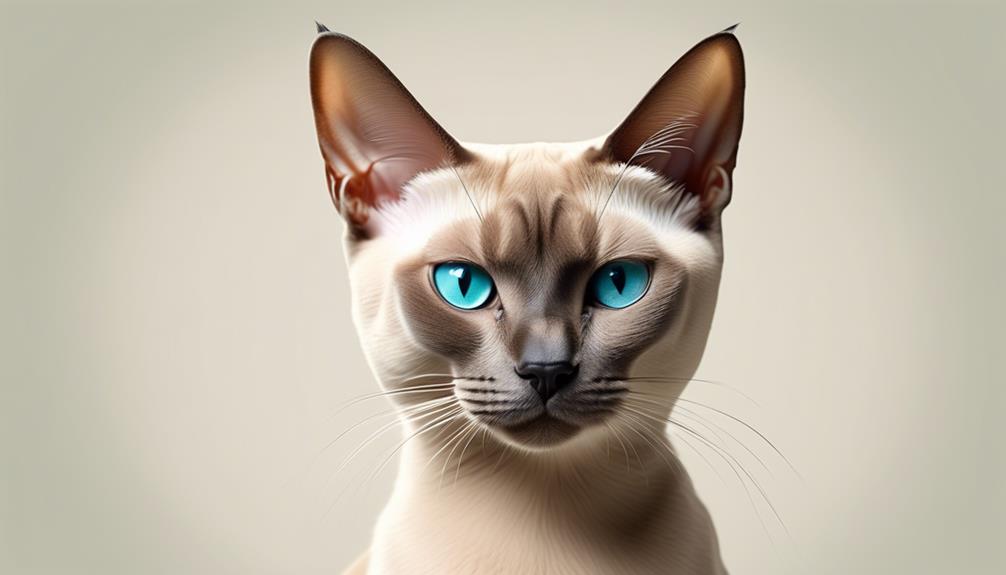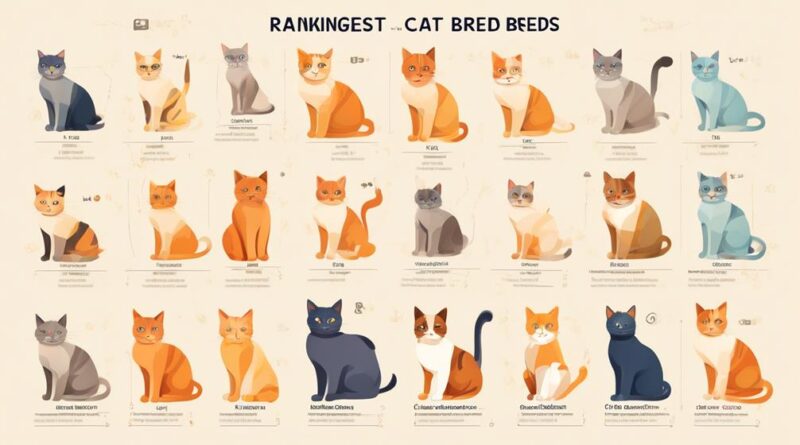What's the Ranking of the Smartest Cat Breeds?
You've probably heard the saying, 'Curiosity killed the cat.' But when it comes to ranking the smartest cat breeds, curiosity might just be their greatest asset.
Have you ever wondered which feline friends are the brainiest? Well, get ready to be surprised as we uncover the top contenders in the world of intelligent cats.
These breeds are sure to challenge your preconceptions and make you rethink what it means to be a clever cat.
Abyssinian
The Abyssinian cat breed is renowned for its intelligence and curiosity, making it an engaging and active pet choice for households. Their intelligence often leads to a desire for mental stimulation, so training techniques are essential for keeping them content. Engage their intellect with interactive toys and puzzle feeders to provide mental challenges. Additionally, consider clicker training to teach them tricks and behaviors, as they're quick learners and enjoy the mental stimulation.
In terms of behavior, Abyssinians are known for being lively and affectionate. They thrive on attention and interaction, so be prepared to spend quality time playing and bonding with them. Providing plenty of vertical space with cat trees or shelves can satisfy their natural inclination to climb and perch, keeping them entertained and preventing boredom.
When it comes to grooming, Abyssinians have a short, fine coat that requires minimal maintenance. Regular brushing with a soft bristle brush helps to reduce shedding and keep their coat in top condition. Additionally, ensure their dental health by introducing regular teeth brushing into their grooming routine. This not only prevents dental issues but also strengthens the bond between you and your feline companion.
Siamese
Coming from the lively and affectionate Abyssinian breed, the Siamese cats are known for their striking appearance and vocal nature. Siamese cats are intelligent and curious with a playful and social temperament. They're highly interactive and thrive on companionship, often forming strong bonds with their human families. Their intelligence makes them quick learners, and they enjoy interactive toys and puzzle games that challenge their minds. However, they can be quite demanding of attention and may vocalize their needs loudly, earning them a reputation for being talkative.
In terms of health, Siamese cats are generally healthy but may be prone to certain genetic conditions such as dental issues, respiratory problems, and heart disease. Regular veterinary check-ups are essential to maintain their well-being. Grooming Siamese cats is relatively easy due to their short, fine coat. They require weekly brushing to minimize shedding and keep their coat in good condition. Additionally, their striking blue almond-shaped eyes need regular cleaning to prevent tear stains.
Bengal
A highly energetic and intelligent breed, Bengals are known for their distinctive leopard-like coat and playful nature. When it comes to intelligence, Bengals rank high among cat breeds. They're quick learners and enjoy the mental stimulation of training sessions. Positive reinforcement techniques work best with Bengals, as they respond well to praise and rewards. Interactive toys and puzzle feeders can also help keep their agile minds engaged.
In terms of personality and behavior traits, Bengals are often described as curious, active, and vocal. They enjoy being involved in household activities and may even learn to play fetch. Bengals aren't the type of cat to laze around all day; they thrive on physical and mental challenges. This breed also tends to form strong bonds with their human companions and can be quite affectionate. However, their high energy levels and need for stimulation mean that they may not be the best fit for every household.
When considering a Bengal as a pet, it's essential to provide plenty of opportunities for exercise, play, and mental enrichment. Interactive play sessions and puzzle toys can help satisfy their natural instincts and keep them mentally sharp. With the right approach to training and enrichment, Bengals can make loving, intelligent, and entertaining companions.
Scottish Fold
What unique physical trait sets the Scottish Fold breed apart from other cats?
Scottish Folds are easily distinguishable by their distinctive folded ears, which give them an adorable, owl-like appearance. This unique characteristic is a result of a genetic mutation that affects the cartilage in their ears. It's important to note that not all Scottish Folds have folded ears; some may have straight ears due to breeding restrictions in some countries to prevent health issues associated with this trait.
In addition to their distinctive ears, Scottish Folds are known for their round faces and large, expressive eyes, adding to their overall charm. They often have a sweet and gentle temperament, making them wonderful companions.
When it comes to health and care, it's crucial to be aware of the potential risks associated with their folded ears. The cartilage mutation can sometimes lead to ear issues, so regular ear check-ups are essential. Additionally, they're prone to certain genetic conditions, such as polycystic kidney disease and progressive retinal atrophy, so regular veterinary visits are a must for early detection and management.
In terms of grooming, Scottish Folds have a dense double coat that requires regular brushing to minimize shedding and prevent matting. They also benefit from interactive play and mental stimulation to keep them active and engaged.
Burmese
With their sleek, shiny coats and expressive eyes, Burmese cats are known for their affectionate and social nature. When it comes to intelligence, Burmese cats are often considered to be highly intelligent. Some people believe that their intelligence is a myth, but the reality is that Burmese cats are quite smart and can learn various tricks and commands.
Burmese intelligence: myth or reality?
Training tips for Burmese cats
Training a Burmese cat can be a rewarding experience. Due to their intelligence and social nature, they're often eager to learn and interact with their owners. When training a Burmese cat, it's essential to use positive reinforcement techniques such as treats, toys, and praise. They respond well to rewards and will quickly learn to associate certain behaviors with positive outcomes.
Additionally, consistency is key when training a Burmese cat. Establishing a regular training routine and being patient with them will yield the best results. Lastly, providing mental stimulation through interactive toys and puzzle feeders can help keep their intelligent minds engaged and prevent boredom.
Sphynx
Intelligent and social like the Burmese, Sphynx cats are known for their unique hairless appearance and inquisitive nature. Despite their lack of fur, Sphynx cats still require grooming. Due to their hairlessness, they've different grooming needs compared to other breeds. Their skin needs to be regularly wiped with a damp cloth to remove any build-up of oils and dirt. Additionally, they may need frequent baths to keep their skin clean and healthy.
Health concerns are also important to consider when owning a Sphynx cat. Due to their lack of fur, they're more susceptible to temperature changes and need to be kept warm. They're also prone to sunburn, so it's crucial to limit their exposure to direct sunlight. Furthermore, Sphynx cats can be prone to certain skin conditions, such as dermatitis, which can be exacerbated by their grooming needs. Regular vet check-ups are essential to monitor their skin health.
Tonkinese

A lively and affectionate breed, Tonkinese cats are known for their playful nature and striking appearance. They're often considered one of the most intelligent cat breeds, possessing a curious and interactive disposition that sets them apart.
When it comes to intelligence, Tonkinese cats are known to excel, especially when compared to other mixed breeds. Here are some key points to consider when it comes to Tonkinese intelligence and training tips:
- Intelligence Comparison: Tonkinese cats are renowned for their high level of intelligence, often being compared favorably to other mixed breeds. Their ability to problem-solve and learn new tricks makes them a favorite among cat enthusiasts.
- Training Tips: Due to their high intelligence, Tonkinese cats respond well to training. Using positive reinforcement, such as treats and praise, can be highly effective in teaching them new behaviors and commands. It's important to keep training sessions short and engaging to maintain their interest and focus.
- Interactive Play: Tonkinese cats thrive on interactive play and mental stimulation. Puzzle toys, interactive play sessions, and teaching them to fetch can help keep their minds engaged and prevent boredom.
Turkish Van
Known for their striking appearance and love for water, Turkish Van cats exhibit a unique blend of intelligence and playfulness that sets them apart from other breeds. The Turkish Van isn't only known for its distinct coat pattern but also for its exceptional swimming ability. This breed is more than just a pretty face; it's renowned for being both intelligent and active.
The Turkish Van's intelligence is evident in its problem-solving skills and ability to learn tricks and games. These cats are known for their curiosity and quick thinking, making them adept at figuring out puzzles and finding hidden toys. Their active nature means they require mental stimulation and physical activity to prevent boredom, so interactive toys and playtime are essential for keeping them engaged.
In addition to their intelligence, Turkish Van cats have a unique coat pattern, often referred to as 'van' markings, which consist of color on the head and tail with the body being predominantly white. This distinctive coat is coupled with a semi-longhaired, water-resistant fur that's perfect for their love of swimming. Unlike many other cat breeds, Turkish Vans are fond of water and have been known to play in it or even go for a swim.
Frequently Asked Questions
Are There Any Health Concerns Specific to These Cat Breeds?
When considering cat breeds, it's important to be aware of any health concerns that may be specific to certain breeds. Each breed may have unique dietary needs, exercise requirements, and mental stimulation to keep them healthy and happy.
What Are the Typical Personality Traits of These Cat Breeds?
When it comes to personality traits, cat breeds differ in intelligence level, training methods, and behavioral quirks. Understanding these aspects can help you choose the best match for your lifestyle and preferences.
Do Any of These Cat Breeds Require Special Grooming or Care?
When it comes to grooming needs, some cat breeds require more attention than others. It's important to consider their dietary requirements, as well as training methods and exercise needs, to ensure they lead healthy and happy lives.
Are There Any Known Genetic Predispositions or Hereditary Conditions in These Cat Breeds?
Genetic predispositions and hereditary conditions can affect cat breeds' intelligence ranking and behavioral characteristics. It's important to research specific breeds for potential health issues, such as heart conditions in Maine Coons or polycystic kidney disease in Persians.
Are There Any Notable Historical or Cultural Facts About These Cat Breeds?
Historical origins and cultural significance play a significant role in understanding different cat breeds. The history and cultural impact of each breed provide insight into their development and their roles in various societies throughout the years.
Conclusion
So, when it comes to the smartest cat breeds, the Abyssinian, Siamese, Bengal, Scottish Fold, Burmese, Sphynx, Tonkinese, and Turkish Van top the list.
Whether you're looking for a clever companion or just interested in learning more about intelligent felines, these breeds are sure to impress with their quick wit and problem-solving abilities.
Consider adding one of these brainy breeds to your family and enjoy the intelligence and companionship they bring.
